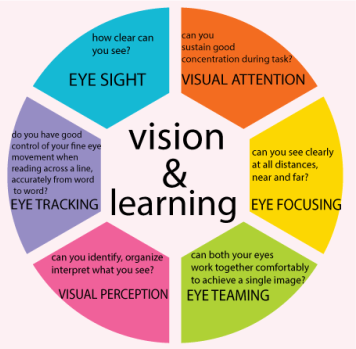Visual Attention - able to sustain good concentration in a visual task
Eye Sight — see clearly in the distance for viewing the chalkboard, at an intermediate distance for the computer, and up close for reading a book.
Eye Tracking — keep the eyes on target when looking from one object to another, moving the eyes along a printed page, or following a moving object like a thrown ball.
Eye Focusing — able to quickly and accurately maintain clear vision as the distance from objects change, such as when looking from the chalkboard to a paper on the desk and back. This allows the child to easily maintain clear vision over time like when reading a book or writing a report.
Eye Teaming — coordinate and use both eyes together when moving the eyes along a printed page, and to be able to judge distances and see depth for class work and sports.
Visual perception — organize images on a printed page into letters, words and ideas and to understand and remember what is read.
In addition, other inter-visual related skills are needed to for good efficient learning.
Eye-hand coordination — the ability to use visual information to monitor and direct the hands when drawing a picture or trying to hit a ball.
Visualisation - Able to "picture" in our mind what is happening in a story we are reading for comprehension.
Visual memory - Ability to retain visual information and to be able to remember and recall details of what was read or seen.
If any of these visual skills are lacking or not functioning properly, a child will have to work harder. This can lead to headaches, fatigue and other eyestrain problems. Parents and teachers need to be alert for symptoms that may indicate a child has a vision problem.
Eye Sight — see clearly in the distance for viewing the chalkboard, at an intermediate distance for the computer, and up close for reading a book.
Eye Tracking — keep the eyes on target when looking from one object to another, moving the eyes along a printed page, or following a moving object like a thrown ball.
Eye Focusing — able to quickly and accurately maintain clear vision as the distance from objects change, such as when looking from the chalkboard to a paper on the desk and back. This allows the child to easily maintain clear vision over time like when reading a book or writing a report.
Eye Teaming — coordinate and use both eyes together when moving the eyes along a printed page, and to be able to judge distances and see depth for class work and sports.
Visual perception — organize images on a printed page into letters, words and ideas and to understand and remember what is read.
In addition, other inter-visual related skills are needed to for good efficient learning.
Eye-hand coordination — the ability to use visual information to monitor and direct the hands when drawing a picture or trying to hit a ball.
Visualisation - Able to "picture" in our mind what is happening in a story we are reading for comprehension.
Visual memory - Ability to retain visual information and to be able to remember and recall details of what was read or seen.
If any of these visual skills are lacking or not functioning properly, a child will have to work harder. This can lead to headaches, fatigue and other eyestrain problems. Parents and teachers need to be alert for symptoms that may indicate a child has a vision problem.

